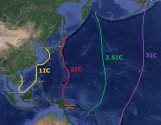Two things that I would like to talk about when it comes to conversations of this kind:
#1 -
Never underestimate your enemy. While pretty much the Capitol Hill have become a concentration of deranged, unhinged and out-of-touch-with-reality fossils, many in the Pentagon certainly aren't (
I guess the Potomac River does its thing). In fact, from what I could gather,
the US military is definitely taking the PLA threat (to their presence in the WestPac) deadly seriously.
On the other side of the divide, I'm sure that
the vice-versa also holds true for the August 1st Building in Beijing. Even with how we've seen US warships getting rusty, US warplanes getting worn out, and US overseas bases increasingly unkept and falling apart, etc etc in recent years - The US military is still a considerable threat of force for Beijing to reckon with, partially and simply because the US military presence and prowess in the IndoPac has been built up over the past 7 decades. Simply put - The inertia is already present.
Of course, China isn't afraid to fight the US directly. But fighting your enemy diligently versus rush-B at your enemy are entirely different matters.
#2 -
Always leave a back door for your enemy to leave. Surely this sounds rather counterintuitive especially to those here who really are looking at the US presence in the IndoPac like a malignant tumor that needs to be removed completely from Asia ASAP (me too) - The US is still a nuclear-armed superpower.
So, unlike the smaller nations of Japan, South Korea and the Philippines - If the US is being backed into a corner and feels that they are left with no choice but to retaliate fiercely, the Capitol Hill may choose unleash nukes against advancing PLA forces in the Pacific.
I believe that
@Patchwork_Chimera (or someone else) has mentioned long ago that nukes are not considered a crucial factor by the Pentagon in a WestPac scenario against China. Coupled with China's No First Use policy regarding her nuclear arsenal - It would be better for both China and the US to keep it that way.
Therefore, should the China-US confrontation in the WestPac evolves into an all-out total war, the ultimate war objective should be the
securing of a strategic depth from the Chinese coastline that stretches all the way to the
2IC in the WestPac, with Guam being the location for the Chinese version of Joint Base Pearl Habour-Hickam - Alongside the
2.5IC as the most forward frontline for the PLA to hold across the CentPac.
View attachment 117059
In the meantime, forget about trying to capture islands as far as Oahu - or even attempt amphibious operations on the beaches of San Francisco. Those are unrealistic and unfeasible goals, even with China's industrial and military prowess. Leave some room for the US to breathe (plus sufficient avenues for both sides to back down and negotiate a ceasefire/end-to-war settlement).
Tl; dr - For China, fighting the US is a matter of national survival. For the US, fighting China is the matter of hegemonic survival. It would be crucial to not cause the US to have the same concern as China - Especially when we are talking about a mentally-deranged-&-unhinged Washington DC.

